Editor's note: New Times followed eight Grizzly Youth Academy students from the start of their journey at the quasi-military program to the end. This is the third installment in the series. The second installment was split into two parts. "Personal growth" was published Oct. 17 and "New outlook" was published Oct. 24.
Gray clouds took over the sky on Dec. 3, 2019. Scattered raindrops hit the caps and hoods of cadets lined up in the center of the "wagon wheel"—school buildings arranged in the shape of a circle—as they choose snacks from a plastic crate.
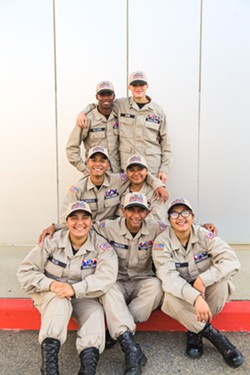
- Photos By Jayson Mellom
- NEXT STEPS For six-months Ashton Tolliver, Cooper Brown, siblings Luis and Nidia Valenzuela, Stephanie Recio-Soltero, Noah Landeros, Dezarey Cerna (from left to right, top to bottom), and Evelyn Frausto (not pictured) worked through both their challenges and those of the Grizzly program.
It's around 3:30 p.m. at Grizzly Youth Academy, and classes just ended for the day. Cadets are in formation, eating their snack before marching on to the next scheduled part of their day.
Eight cadets wearing serious faces are called one-by-one from their platoons.
The cadets pile into a van that takes them to an administrative office where New Times has interviewed them in the past. It was a rare moment, as the cadets are usually in their respective platoons. They crack jokes, talk about their day, mingling just like they would at the end of a normal school day.
The 22-week program is nearing its completion, and while finals might be at the forefront for some of the cadets, it's really the next phase of the program that's on everyone's mind.
Similar to previous classes, the cadets are going through a program that's divided into three phases: acclimation, residential, and post-residential.
A majority of Class No. 43 is finished with acclimation (the first two weeks and an adjustment period) and are about to complete the residential phase with a graduation. While the first two phases might have felt like the most challenging for some cadets (some of Class No. 43's cadets have dropped out of the program), the daunting aspect for others is the post-residential phase.
Life after Grizzly.
Role models
In the post-residential phase, cadets will continue to work with their mentors (the individuals who encouraged them to apply to Grizzly) and case managers to finish high school (vocational school, a continuation school, or college), enlist in the military, or find employment.
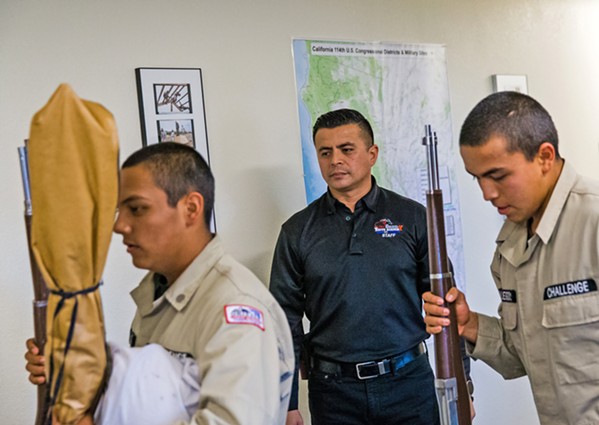
- Photos By Jayson Mellom
- INSPIRE OTHERS Sgt. First Class Angel Salcido (middle) was inspired to work for the Grizzly Youth Academy after mentoring his nephew who was a cadet in Class No. 22.
This step is in the hands of the cadet with the help of weekly mentor meetings, reporting to case managers, and having access to their former cadres.
"I would say [the cadres] are relentless positive male or female role models. They just do not give up on these kids," Sgt. First Class Angel Salcido said.
Salcido is the cadre supervisor and training coordinator for the academy. His background includes serving in the Marine Corps from 2001 to 2008, a position in the Bureau of Prisons and Corrections, and the California State Guard.
He said he's always enjoyed serving others, but working with at-risk youth is his calling.
When he transitioned from the Marine Corps to corrections, Salcido said he quickly learned that he wanted to help steer youth in a positive direction in order to prevent them from becoming inmates.
"I felt that those individuals were stuck in an environment in which change was not necessarily far-fetched but they didn't have the opportunity," he said.
Salcido learned about the academy when he became the mentor for his nephew—a cadet of Class No. 22.
When Salcido arrived at Camp San Luis Obispo for Family Day that year, he said it reminded him of his time at Camp Pendleton.
"It had the same smells of wet dirt, the older buildings, and hearing the soldiers calling cadence. I thought they were soldiers and then I realized they were youth, the students. They were motivated," he said.
Through his mentor experience and training, Salcido fell in love with the program and made it a point to introduce himself to the commander at the time and inform him of his interest in working with the academy.
"I want to say six months later I was on the line, working with at-risk youth, and that's where my journey began, 10 years ago," he said with a laugh.
Currently, he oversees 24 cadres and four platoon sergeants who wear multiple hats in order to guide more than 200 cadets throughout the 22-week program and beyond.
Cadres introduce and enforce structure, instill discipline, assist the teaching faculty, facilitate physical fitness, informally counsel students, teach the cadets coping mechanisms, de-escalate situations, and help cadets coexist with their peers.
The overarching concept that the cadres work through with the cadets is that Grizzly isn't an obstacle in their life. Salcido said that although the academy is a challenge, challenges present opportunity.
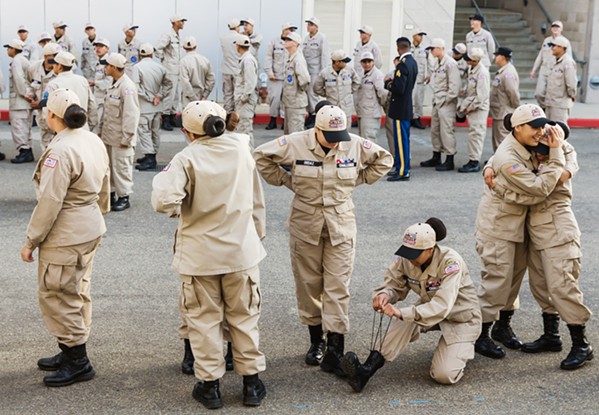
- Photos By Jayson Mellom
- CELEBRATION Grizzly Youth Academy Class No. 43 gears up for its graduation ceremony outside of the Cal Poly Performing Arts Center on Dec. 20.
"The question is, what is the student going to do with that opportunity?" he said. "Are they going to capitalize or are they going to fall asleep?"
Cadres are vital to the program, Salcido said, because, along with the rest of the academy's academic and military team, they try to understand each cadet's personal life in order to help them be successful. Which, he said, can be difficult because that cadet might not be used to a daily schedule or being told what to do.
"But we are relentless. We don't give up on ourselves, and, more importantly, we don't give up on them," Salcido said. "It's a never-ending resource, so it doesn't stop after graduation."
When Salcido was a cadre and watched his first platoon graduate, he said he felt like a proud dad.
"These kids work hard and we guide them, but their success is theirs, I don't want to take any of that from them," he said. "But it's nice to know that we were part of their process."
Evelyn Frausto
Evelyn Frausto, 16, has made it a habit to get the most out of her experience with the academy. Frausto said she was one of about 50 cadets who were chosen for an internship—the internship could be for the academy or for a business outside of Camp SLO.
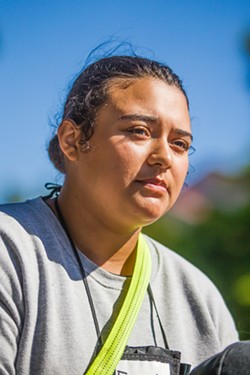
- File Photo By Jayson Mellom
- NEW PATH Evelyn Frausto once juggled two part-time jobs and school to pay for her car; however, when she's done with Grizzly Youth Academy, she wants to focus on her family.
Her internship was with House of Bread, where she was able to display, package baked goods, and assist with the baking process.
"I get to bond with people over there. I get to communicate with the outside world, which is something I don't get to do here," she said with a laugh.
Frausto said her employers and coworkers would tell her how proud they were of her participation in the program.
On top of her internship, Frausto was taking her last two classes—economics, and college and career—to complete the necessary credits to graduate from high school.
She'd already applied to Gavilan College, a community college in Gilroy. When New Times first spoke with Frausto, she said she wanted to study psychology and potentially use that education in the forensics field, but she's since changed her mind.
Frausto now wants to pursue a career as a pediatrician.
Her goal is to work at Kaiser Permanente because she remembers visiting her pediatrician and the positive relationship they had. He was attentive and caring toward her needs, compared to visiting the doctor as an adult.
Overall, Frausto felt good about what she learned at the academy and how she will apply it to her life moving forward. But she's not done with Grizzly just yet; Frausto said she's been asked to be a senior cadet. A senior cadet, she said, comes back for the first two weeks of a class to help other cadets who are transitioning into Grizzly life.
"I remember in the beginning of the program when I was crying every day and every hour, [a senior cadet in her platoon] would always be there and tell me 'not to worry' or 'it will get better,'" Frausto said. "She would brighten our days, honestly."
She's happily accepted the role and will be returning during the acclimation phase for Class No. 44.
Luis and Nidia Valenzuela
Luis Valenzuela, 18, is only slightly worried about returning to his small hometown of Huron, in Fresno County.
"I'm not sure what I want to study in college and have a career in. I just don't want to be confused about what I want to do and then eventually not do anything for too long," Luis said.
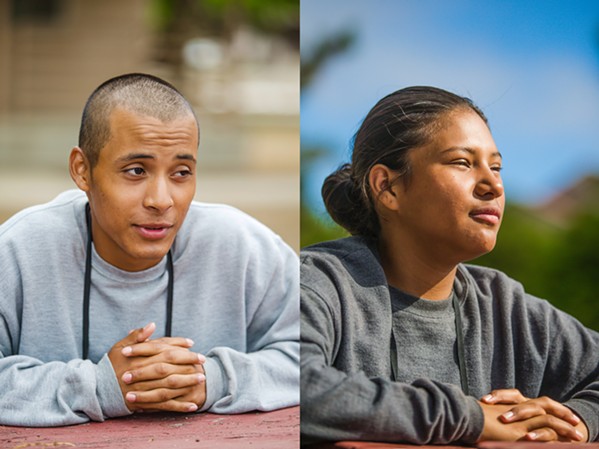
- File Photo By Jayson Mellom
- SETTING AN EXAMPLE Luis and Nidia Valenzuela are siblings from Fresno County who supported each other in the decision to better their lives by joining Grizzly Youth Academy together.
He plans to attend a continuation school to receive his high school diploma, get a part-time job, and save up to buy a car.
He said he doesn't see himself staying in his hometown long term because there aren't many job opportunities. There are a lot of farmworker positions available, but he's not interested.
"I don't really see a lot of ways to move up in that career field," Luis said. "It feels like the type of work that I'll just get stuck into and I'll feel like I'll barely make enough money to keep going."
He hopes to take his family with him when he moves, if possible. Luis said he feels they're so used to the area that they haven't thought about the possibility of starting somewhere else. He's hoping to begin that conversation.
As the residential phase of the program comes to a close, Luis said Grizzly doesn't seem that hard to him anymore. He would describe it as a challenging milestone in his life—one that hopefully will have many milestones.
"I don't want this to be the biggest thing that I've accomplished in my life," he said.
Luis doesn't want to be thought of as a person who's only accomplished the Grizzly Youth Academy; he wants more for himself and his sister, Nidia.
"If she sees me going, hopefully she'll be motivated to go to college too," he said.
Nidia, 17, told New Times she does plan to attend community college once she earns her high school diploma. In order to do that, she's going to attend a continuation school with her brother to gather enough credits to finish her senior year.
In the long term, Nidia said she wants to get a part-time job, continue her education through a community college, and eventually transfer to CSU Fresno. Her ambitions are to be a neonatal nurse and work with babies in the neonatal intensive care unit. Her other option is potentially joining the Army and becoming a field medic, although she would prefer working with babies.
"I have a couple of nephews, and since I was small, I would always take care of them," Nidia said as she took two photos out from her name tag holder.
Being close to her family, she said, is important to her. It's part of the reason why she wants to stay close to Huron.
"I want to stay connected to my hometown because it's where my memories were made," Nidia said. "But at the same time I've seen a lot of negative things there, and there are drug dealers."
She might, she said, change her mind and want to move to a city or another town, but would most likely choose a location in close proximity to her childhood roots. Nidia is always thinking about the future and said if she had children, she wouldn't want them to be in an environment similar to hers.
"I want to show my kids, if I have kids, the right path instead of the path that I chose," Nidia said.
Noah Landeros
When New Times asked 18-year-old Noah Landeros how school was wrapping up for him, he took a deep breath and said, "I'm holding the rope as tight as I can."
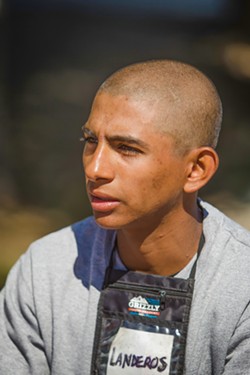
- File Photo By Jayson Mellom
- CHECK LIST Noah Landeros plans to leave his past behind and focus on receiving higher education and setting the standard for his family.
Overall, Landeros said he's ending on a high note with mostly A's and B's, but he's been working to make up assignments he's missed in his contract class. He missed a chunk of time because he attended a Military Entrance Processing Station (MEPS).
Initially, he said, he had plans to apply for a housing program where former foster youth live in the same apartment complex or house with other former foster youth.
"I wanted to think that could happen, but there was still a possibility that it wouldn't, and I want to be more realistic with my decisions and the choices that I make," Landeros said.
His "realistic" decision is to join the military. Landeros met with a U.S. Armed Forces recruiter for initial questioning, interviewing, and to discuss his options. He was then given an appointment at the MEPS office where he took the Armed Services Vocational Aptitude Battery (an aptitude test developed by the Department of Defense) and had a physical checkup. Landeros said he knows he passed and is eligible to join the military; he's just waiting for his deployment date.
"The military is similar to this program because it gives me housing, food, and other things that I need," he said.
Landeros plans to sign a three-year contract before he completely pledges himself to the military forces of the U.S., to try it out.
It will also help him go to college, which is what he wants to do.
"I'm getting ready for my future," he said. "I feel like these are the stepping stones. I just need to pick which ones I want to step on."
Landeros has always been positive and said he wants to spread that positivity and the encouragement to not give up to other foster youth.
"Maybe I could go talk to schools, but first I have to make something of my life so I have a reason to do that," he said.
Ashton Tolliver
When Ashton Tolliver was interviewed by New Times in December, he was 17. Tolliver turned 18 on Jan. 8, 2020, and his zodiac sign is a Capricorn. He said the characteristics of the specific sign apply to him—hardworking, distrustful of others, and hardheaded.
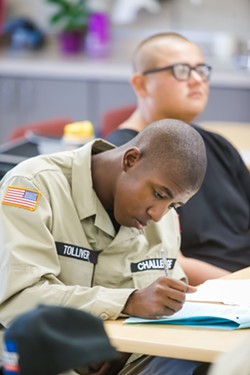
- Photos By Jayson Mellom
- NEW EXPERIENCES Ashton Tolliver said being in a supportive environment where adults see potential in him is something he's not used to but appreciates.
His hardworking trait, Tolliver said, helped him push through the challenges of the academy—early mornings, vigorous exercises, classes. Almost three weeks before graduation day, he said he was trying to focus on getting a C grade up to a B—at the time he was very close. In the rest of his classes, he had A's and B's and felt confident about the finals that were ahead of him.
Tolliver's other trait, distrustful of others, is something the academy helped change.
"I'm just way different. I changed in a lot of different ways, but I've become more comfortable with myself and working with other people," he said. "I'm still not a people person, but I became more of one, I guess."
Before Grizzly, Tolliver used to get into fights with other classmates who would taunt him about his attitude or life situation. With the help of school counselors, he said, he's gained coping skills and almost eliminated his temper—something he's struggled with for a long time.
The new head on his shoulders has even changed his outlook on continuing his education. Tolliver submitted his application to attend Antelope Valley College in Lancaster.
He was playing around with the idea of working a construction job with his cousin and landing a position at the Costco in his area. However, he said that going down an educational path means that he'll need to have a flexible schedule for classes. He wants to study aerospace and see what career path that education can take him down.
Cooper Brown
Cooper Brown, 16, has about 87 credits left to earn before he can receive his high school diploma. When he spoke to New Times in September, Brown said, he and his mother had decided to continue his education through independent studies.
This means he'll be coming back to Grizzly once a week to collect his coursework, receive assistance, and take tests if necessary.

- File Photo By Jayson Mellom
- GOALS Cooper Brown said his long-term career goal is becoming a mechanic for race cars to fulfill is love of cars and going fast.
"It's a decision I agree with," he said.
He's currently a junior, and if he stays on track, Brown should graduate at the end of his senior year.
As for his steps post-Grizzly, Brown had been thinking about joining a branch of the U.S. Armed Forces. During the Thanksgiving break, he finally told his parents he's decided that once he receives his high school diploma, he's applying to join the Army.
"I'm kind of stuck on the idea of the Army. I'm not completely sure why, but I like it," he said.
Brown still has an interest in being a mechanic and hopes that he can learn the trade through the Army and make a career out of it. It's not a definite career path for him yet, but he knows once he's in the service he'll figure out what is best for him.
Dezarey Cerna
Dezarey Cerna turned 17 in November 2019, and her grandmother told her she has to wait until she's 18 years old until she can move out. Cerna initially wanted to complete her high school education in Hemet and live with her aunt, but said she agrees with her grandmother's thought process. She's not completely ready to be on her own.
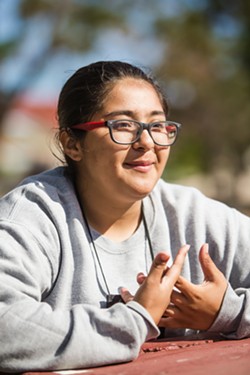
- File Photo By Jayson Mellom
- GOING FORWARD TOGETHER Dezarey Cerna feels like she's accomplishing more in school because the teachers at the charter school don't let anyone fall behind; they're always ready to help.
Instead, Cerna said she will move back in with her grandmother and continue her senior year at her old high school in the city of Greenfield in Monterey County. She's a little nervous about going back to her old school and seeing some of her old friends again.
She saw two of those friends during Thanksgiving break, and they told her they were excited for her to complete the program so she could join them in smoking weed again.
"I told them I don't want to do that. I figure if they ask, I'll just tell them I'll hit it [vape pen] later, and whenever I see them I'll just dodge them," Cerna said.
She told New Times she's afraid of going back into that environment.
"They're going to be there and see me sober and maybe they're going to want to pass me a pen or a beer," she said.
But Cerna said she wants to focus on the trust that she's rebuilt with her grandmother. On the drive back from visiting her family during Thanksgiving, she said, her grandmother told her how happy and proud she was of Cerna's upcoming accomplishment.
"It's been a big change for my family. My grandmother cried happy tears and not like before when my bad decisions would make her cry in a bad way," she said.
Grizzly has taught Cerna a lot about herself and appreciating the little things in life. She said she's currently learning to appreciate the new effort that her mom is putting into their relationship.
Her mother, she said, texted Cerna to say hello and ask how she's doing. It's a new line of communication that Cerna said she's unsure of but appreciates.
After she completes high school, Cerna plans to attend community college but is still deciding on whether to follow an educational path that will lead her to being a math teacher or a phlebotomist, like her aunt.
Stephanie Recio-Soltero
Over Thanksgiving break, Stephanie Recio-Soltero visited with an old friend who she used to smoke weed with. Only this time, she wasn't tempted to smoke, and she realized how ridiculous her friends looked and acted while they were high.
It made her think.
She said she's not worried about going back to the same environment, but she's slightly worried about the choices she'll make.
"It's not my environment, you know, it's something I noticed this homepass," Recio-Soltero, who's now 19 years old, said. "It's not where I'm around or who I'm with, it's what I choose to do."

- File Photo By Jayson Mellom
- NEW BEGINNINGS Stephanie Recio-Soltero is making a change in her life, academically, mentally, and physically, for her almost 10-month-old daughter.
She said a sergeant told her platoon that six months (the duration of the program) isn't going to necessarily change them.
"He had a point. Six months of me being here, it was easy to be sober because you don't have access to [meth], and I wasn't around it," Recio-Soltero says.
Going home is the real deal, she said, to put her Grizzly knowledge to the test. She has to be strong for her daughter, continue her education, and work to provide for her small family.
She was also chosen for an internship opportunity through the program. Recio-Soltero's internship was with The Center for Health and Prevention as a receptionist. She was the first person patients saw, assisting them as they arrived, answering phones, and filing paperwork. The experience inspired her to enroll in an eight-month certification course to become a medical assistant.
Recio-Soltero graduated from Grizzly with enough credits to receive her high school diploma.
"I never thought I was going to do it. I never thought I would be done with school," she said smiling. "I'm doing it two years later, but I'm doing it."
Before Grizzly, Recio-Soltero said, she was in a dark place. She described that time as being in a deep hole, losing hope for everything, and believing that she was going to be a drug addict for the rest of her life.
"I want people to know it's OK to ask for help. If you want the help, you have to take it. I needed it, I needed a push, and I did it," she said.
The program, asking for help, and holding onto hope is what got her to this point.
"You have to struggle to be on top. That's another thing I learned at Grizzly, if you think you're not going to fail, you're setting yourself up for failure. No matter what, you have to fail to succeed," she said. Δ
Staff Writer Karen Garcia can be reached at [email protected].

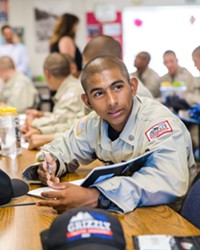
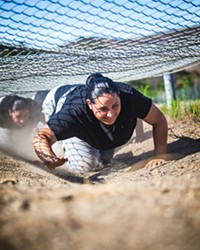
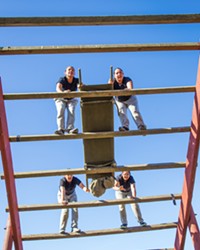
Comments